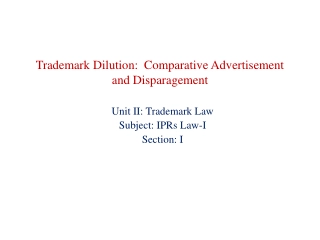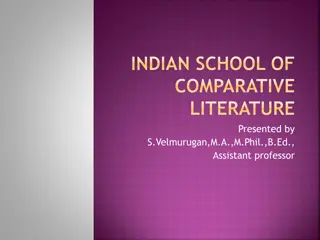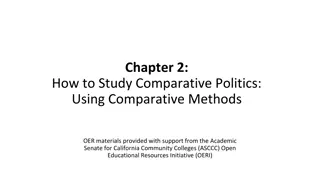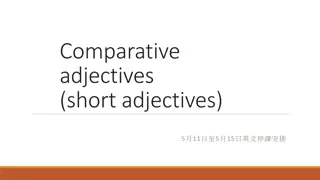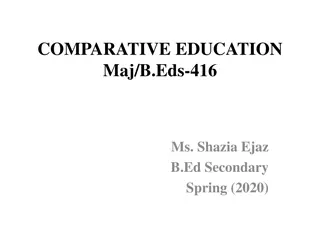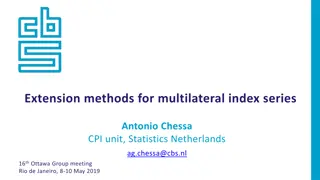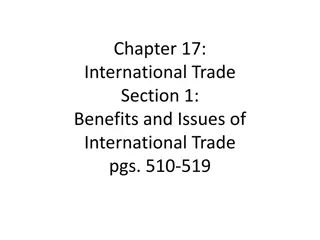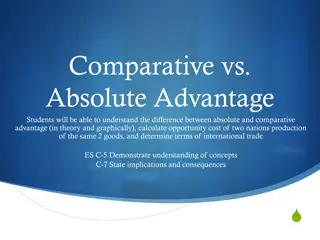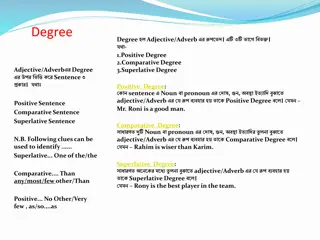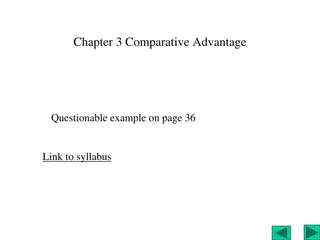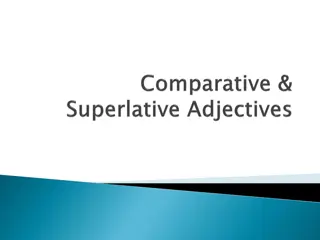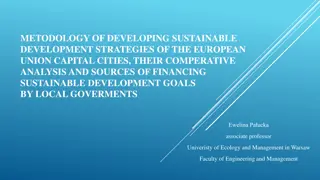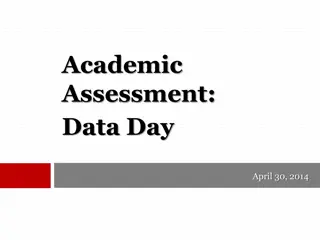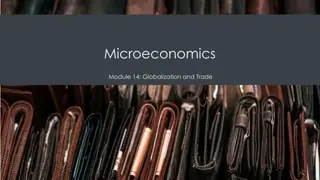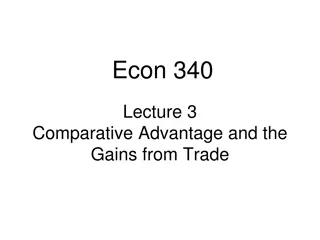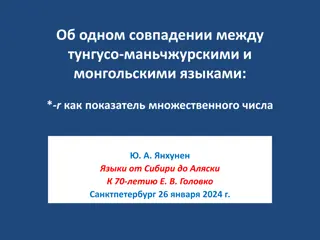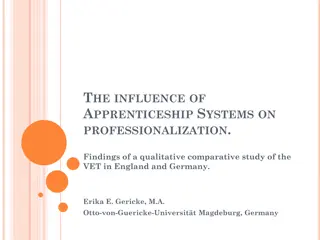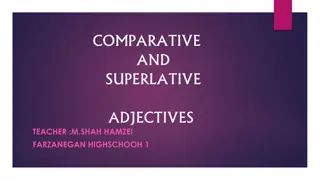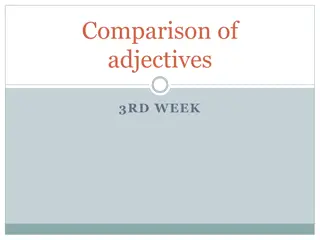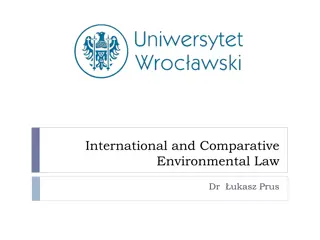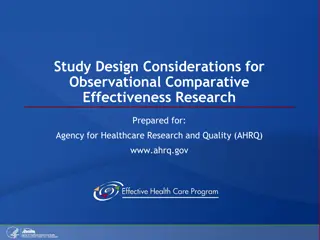Trademark Dilution and Comparative Advertisement
Trademark dilution and comparative advertisement in trademark law. Understand the grounds for trademark infringement and the elements needed to establish dilution or disparagement. Explore the importance of protecting registered trademarks and the limitations of comparative advertisement.
0 views • 6 slides
Comparative Analysis of Positive Charge's Charging Stations Evolution
This PowerPoint template example created by Romy Bailey for Positive Charge showcases a comparative study of high-speed charging stations versus traditional charging stations, along with a comparison of past year versus current year data, and a year-over-year analysis of Positive Charge's growth. It
1 views • 6 slides
Comparative Sociology
Comparative Sociology is a specialized branch that compares societies to provide generalizations, focusing on the structure and jurisdiction of groups and organizations. It involves studying affinities and disparities to predict outcomes. The discipline is closely related to Social Anthropology. Com
3 views • 15 slides
Insights into the Indian School of Comparative Literature: A Comprehensive Overview
The Indian School of Comparative Literature, pioneered by Dr. Buddhadeva Bose in 1956 at Jadavpur University, plays a crucial role in studying the diverse languages and rich literary traditions of India. This academic discipline has grown significantly, with a focus on French symbolist poetry's infl
2 views • 14 slides
Comparative Health Effectiveness Study: Quality of Life Outcomes with Medical and Invasive Approaches
This primary report funded by the National Heart, Lung, and Blood Institute presents the International Study of Comparative Health Effectiveness with Medical and Invasive Approaches. The research evaluates whether an invasive strategy improves health status in stable patients with moderate ischemia,
1 views • 21 slides
Understanding the Scientific Method in Comparative Politics
Exploring the scientific method in political science and comparative politics reveals the systematic approach to acquiring knowledge through observation, hypothesis testing, and analysis of outcomes. Adherence to rules of inference is crucial for validity in scientific research, enabling researchers
0 views • 28 slides
Comparative Adjectives: Short Adjectives and Usage
Comparative adjectives are used to compare two things, such as the length, size, or appearance. They can be formed by adding -er to short adjectives like big, long, thin, short, and pretty. When the adjectives end in -y, change the -y to -i and add -er. Use "than" to compare two things in the same s
5 views • 10 slides
Understanding Comparative Education: Scope and Aims
Comparative education involves studying educational theories and practices across different countries to analyze the relationship between education and society. It aims to explain educational systems, aid in the development of institutions, and form generalized statements applicable in various natio
0 views • 31 slides
Comparative Effectiveness Study of Second-Line Agents in Status Epilepticus Treatment: ESETT Trial
Comparative effectiveness study known as ESETT Trial aims to determine the most effective second-line agent for treating benzodiazepine-refractory status epilepticus in emergency departments. Fosphenytoin, valproic acid, and levetiracetam are common choices, but the best option remains uncertain. Th
0 views • 48 slides
Approaches to Study Comparative Politics: Traditional vs. Modern Perspectives
This chapter discusses the importance of approaches in the study of comparative politics, categorizing them into traditional and modern perspectives. Traditional approaches include philosophical, historical, and traditional institutional approaches, highlighting their strengths and limitations. Mode
0 views • 7 slides
Comparative Effectiveness Study of Fosphenytoin, Valproic Acid, and Levetiracetam in Status Epilepticus Treatment
The ESETT study is a comparative effectiveness trial evaluating fosphenytoin, valproic acid, and levetiracetam in treating benzodiazepine-refractory status epilepticus. The goal is to determine the most effective among these agents while assessing safety outcomes. Inclusion criteria focus on patient
0 views • 48 slides
Comparative Study of Apprenticeship Systems in England, Finland, and France
This comparative study explores the rhetoric and reality of apprenticeship systems in England, Finland, and France for 16-18 year-olds. It delves into the policy motivations behind researching apprenticeships and examines the roles of employers within these programs. The study also defines apprentic
3 views • 13 slides
Extension Methods for Multilateral Index Series: A Comparative Study by Antonio Chessa
This study by Antonio Chessa delves into the characterization of extension methods for multilateral index series, highlighting the impact of various factors such as product definition, index formula, weighting schemes, and length of time windows on the index. It addresses the challenges of revising
0 views • 33 slides
Understanding International Trade: Benefits, Specialization, and Comparative Advantage
International trade involves benefits and issues, with specialization playing a key role in driving economic patterns through resource distribution. David Ricardo's theory of comparative advantage revolutionized trade by focusing on producing goods efficiently. Absolute advantage and comparative adv
0 views • 12 slides
The Importance of International Trade: Benefits and Comparative Advantage
Nations engage in trade to exchange goods and services across borders, benefiting from comparative advantage to produce efficiently. Comparative advantage theory highlights the efficiency gains when each nation focuses on what it does best. Importing and exporting goods and services allow countries
0 views • 10 slides
Understanding Comparative and Absolute Advantage in International Trade
Understand the concepts of absolute and comparative advantage through theory, graphical illustrations, and opportunity cost calculations for two nations. Explore the implications and consequences of these concepts in terms of international trade. Specialization, division of tasks, and gains from tra
0 views • 15 slides
Examples of Superlative and Comparative Forms
The content includes examples of superlative and comparative forms, along with positive constructions. Images are used to illustrate each example, making it easy to understand the concepts. Different scenarios are presented to demonstrate the usage of superlative and comparative adjectives in senten
0 views • 42 slides
Understanding Degrees of Adjectives and Adverbs
This content explains the concept of positive, comparative, and superlative degrees of adjectives and adverbs in English grammar. It provides rules and examples for transforming positive into superlative, positive into comparative, comparative into positive, comparative into superlative, and more.
0 views • 8 slides
Understanding Comparative Advantage in Economics: Adam Smith and David Ricardo
Explore the concepts of absolute advantage versus comparative advantage as discussed by renowned economists Adam Smith and David Ricardo. Discover how free market principles, self-interest, and efficient resource allocation shape beneficial economic decisions. Delve into examples of comparative adva
0 views • 13 slides
Comparative and Superlative Adjectives Usage Guide
Discover how to form and use comparative and superlative adjectives to compare two or more nouns. Learn the rules for adding -er or -est endings, using "more" or "most," and irregular adjectives like "good" and "bad." Follow step-by-step formulas to create sentences with comparative and superlative
0 views • 11 slides
Comparative and Superlative in Pennsylvania Dutch 101
Covering the formation of comparative and superlative forms in Pennsylvania Dutch (PD), the content explains how PD adjectives add endings and change stem vowels to express comparison. It discusses irregular adjectives and provides examples to practice forming comparative forms in PD phrases.
0 views • 11 slides
Sustainable Development Strategies in EU Capital Cities: A Comparative Analysis
This study delves into the methodologies of developing sustainable development strategies for European Union capital cities, analyzing their comparative elements and exploring sources of financing sustainable development goals by local governments. It encompasses an overview of the concept of sustai
0 views • 31 slides
Academic Assessment Data Day - Insights and Findings
Delve into the details of the Academic Assessment Data Day held on April 30, 2014, focusing on various workshops, staff satisfaction surveys, study abroad insights, assessments administered, comparative data analysis, and important dates related to assessment results. Explore the reasons and obstacl
0 views • 16 slides
Comparative Law: Research, Analysis, and Resources
Explore the world of comparative law through research and study of legal systems, including Italian and foreign laws. Delve into comparative legal analysis, characteristics of legal systems, and the study of legal sources. Discover in-depth insights from a variety of books and academic journals, as
0 views • 36 slides
Understanding Globalization, Trade, and Comparative Advantage in Economics
Globalization and trade play a crucial role in the interconnected world economy. This module explores the gains from international trade, barriers to trade, costs of globalization, and the concepts of absolute and comparative advantage. Absolute advantage is when a country can produce a good using f
0 views • 27 slides
Comparative Analysis of ALT and CALT Methods in Accelerated Life Testing
This study presents an extensive investigation comparing Calibrated Accelerated Life Testing (CALT) with Classical Accelerated Life Testing (ALT) methods. It explores the use of 6 samples in CALT versus 100 samples in ALT, emphasizing the advantages of CALT in terms of sample size and efficiency. Th
0 views • 20 slides
Understanding Comparative Advantage and Gains from Trade
In this lecture on comparative advantage and gains from trade, the concept of why countries trade, price differences, supply and demand, the Ricardian model of trade, identifying comparative advantage, and critiques of comparative advantage are discussed. The benefits of free trade and how it leads
0 views • 53 slides
Evaluation Culture in SEE: Comparative Study in Public Procurement Innovation
This study explores the evaluation culture in South East Europe (SEE) with a focus on public procurement innovation through a comparative and needs assessment approach. The research considers the feasibility of benchmarking with both objective and subjective indicators, highlighting challenges in di
0 views • 20 slides
Comparative Study on Mongolic and Tungusic Languages
Explore the fascinating linguistics of Mongolic and Tungusic languages, delving into their historical sources, internal reconstruction, morphology, syntax, and class markers. Discover the parallels and differences between these language families, analyzing aspects such as sound systems, lexicon, and
0 views • 16 slides
Comparative Study of Apprenticeship Systems in VET: England vs Germany
Qualitative comparative study by Erika E. Gericke explores the influence of apprenticeship systems on professionalization in Vocational Education and Training (VET) in England and Germany. Findings delve into biographical orientations towards occupation, the role of VET systems, changes in the worki
0 views • 12 slides
Comparative Study of Code of Ethics for Librarians in Philippines, Indonesia, and Malaysia
This comparative study delves into the Code of Ethics for Librarians in Philippines, Indonesia, and Malaysia, exploring their history, components, and significance. Highlighting the importance of ethical guidelines, it emphasizes how codes of ethics serve as a foundation for professional conduct, qu
0 views • 14 slides
Understanding Comparative and Superlative Adjectives: M. Shah Hamzei Farzanegan High School
Learn how comparative and superlative adjectives are used to compare objects in English language. Find out the rules to form the comparative and superlative forms of adjectives based on the number of syllables, spelling changes, and exceptions. Improve your English language skills with practical exa
0 views • 13 slides
Comparative and Superlative Forms of Adjectives in Latin Grammar
Exploring the declension patterns and irregular forms of comparative and superlative adjectives in Latin, including examples and comparisons with paradigms of different declensions. Learn about the nuances in the declining of 3rd declension adjectives and their comparative forms, along with exercise
0 views • 14 slides
Comparative Approaches in Educational Enquiry: A Scholar's Perspective
This session delves into the world of comparative research in education, exploring different settings and methodologies. Dr. Michael McEwan shares insights on Glassick's Framework for design and the importance of appropriate methods. Discover the essence of comparative research, including ex post fa
0 views • 18 slides
Guide to Comparator Selection in Comparative Effectiveness Research
Proper selection of comparators is crucial in comparative effectiveness research to ensure the validity and clinical relevance of study results. This process involves choosing concurrent, active comparators from the same population, addressing potential biases, defining time zero for all comparator
0 views • 15 slides
Dupont Analysis in Retailing Sector: A Comparative Study of Walmart and Tiffany
Explore the application of the Dupont Analysis in the retailing sector through a comparative study of Walmart and Tiffany. Analyze their income statements and profit margins to understand how different strategies impact their financial performance.
0 views • 21 slides
Comparative and International Environmental Law Course Overview
Explore the world of Comparative and International Environmental Law with Dr. ukasz Prus through in-depth examinations, take-home exams, and insightful discussions on topics such as environmental policy, law sources, and regional systems. Dive into the complexities of waste management, common legal
0 views • 102 slides
New Global Developments in Comparative Politics Since the 1980s
The lecture by Dr. Maame Adwoa A. Gyekye-Jandoh explores new global developments in Comparative Politics since the 1980s, covering topics like rapid industrialization in Asia and the collapse of communism in the Soviet Union and Eastern Europe. Students are introduced to key concepts such as the Com
0 views • 20 slides
Study Design Considerations for Observational Comparative Effectiveness Research
This presentation outlines key considerations for study design in observational comparative effectiveness research, including rationale for design choice, defining start of follow-up, inclusion/exclusion criteria, exposures of interest, outcomes, and potential confounders. It discusses various study
0 views • 16 slides
Comparative Study of Law Enforcement and Military Efforts in Homeland Security
This comparative study delves into the perceived militarization of American law enforcement and its implications for homeland security efforts. It explores differing missions, approaches, government forms, threats, and efforts to minimize militarization, highlighting the blurring line between milita
0 views • 23 slides
